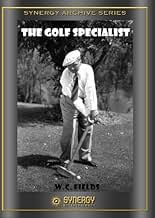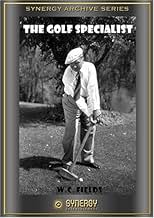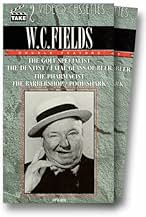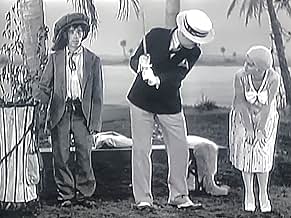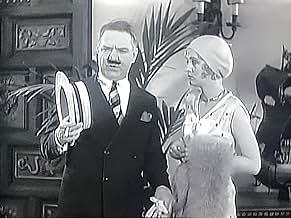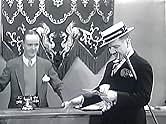IMDb RATING
6.2/10
1.3K
YOUR RATING
J. Effingham Bellweather plays golf despite many slapstick setbacks.J. Effingham Bellweather plays golf despite many slapstick setbacks.J. Effingham Bellweather plays golf despite many slapstick setbacks.
Allan Bennett
- Guest in Lobby
- (uncredited)
William Black
- Guest in Lobby with Letter
- (uncredited)
Naomi Casey
- Little Girl
- (uncredited)
John Dunsmuir
- Deep Sea McGurk - House Detective
- (uncredited)
Shirley Grey
- House Detective's Wife
- (uncredited)
Jack Irvin
- Deep Sea McGurk
- (uncredited)
Johnny Kane
- Walter - The Desk Clerk
- (uncredited)
Harriet E. MacGibbon
- Lady Walking Dog
- (uncredited)
Allen Wood
- The Caddy
- (uncredited)
- Director
- Writer
- All cast & crew
- Production, box office & more at IMDbPro
Featured reviews
THE GOLF SPECIALIST (RKO Radio, 1930), directed by Monte Brice, stars comedian W.C. Fields in his first sound comedy, a comic supplement of one of his famous vaudeville routines. Fields, whose career consisted that as a headliner of "The Ziegfeld Follies," with his juggling routine as one of his trademarks, failed to equal the popularity of Charlie Chaplin or Buster Keaton as opposed to silent film comedians. For THE GOLF SPECIALIST, a 20 minute short, it was evident that what Fields needed was sound to put over his routines, but his newfound success in feature length comedies was only a few short years away.
The plot for THE GOLF SPECIALIST isn't much, actually. Divided into two parts, the introduction, set at a Florida resort, opens in the lobby where a flirtatious blonde (Shirley Grey) gets a man in trouble with a house detective (John Dunsmuir), who happens to be her husband. After the jealous detective twists man into a pretzel, wheeling him out of the lobby, J. Eppington Bellweather (W.C. Fields), another guest, enters the scene. Before making the acquaintance with the blonde, there's a tough looking thug looking to give him a "knuckle massage," and a screechy voiced little girl (Naomi Casey, age 5) trying to panhandle money out of him. Attracted to the blonde, Bellweather invites her out for a game of golf. The second half of the story finds Bellweather, blonde and caddy out in the golf course where the golf specialist, who repeatedly tells the girl to "keep your eye on the ball," to meet with many distractions, ranging from caddy's squeaking shoes to various passersby preventing him from ever hitting the ball out into the green before the unexpected occurs.
Of all the comic supplements, the golf game ranks one of Fields' most famous. Performed on stage, later in the silent comedy, SO'S YOUR OLD MAN (Paramount, 1926), and again for the concluding moments of YOU'RE TELLING ME (Paramount, 1934), THE GOLF SPECIALIST simply gives indication of how the act was performed on stage. As with most early talkies, the film is quite primitive in appearance with echoing voices, cardboard backdrop in place of actual outdoor surroundings, and lack of background music with the exception of during the opening credits. Whatever the film lacks, it makes up for it with its star attraction, W.C. Fields, whose name is the only one listed in the cast. It's also interesting getting a glimpse of a younger and thinner Fields, with clip on mustache, cigarette and straw hat as opposed to a older, heavier, cigar smoking con man minus mustache that would become the better known Fields' character trait. In THE GOLF SPECIALIST, little is known of his character with the exception of a wanted poster listing him for petty crimes as passing as the Prince of Wales, eating spaghetti in public, spitting in the Gulf Stream, failing to pay installments on a straitjacket, but nothing quite evident from his introduction as con man and golf specialist in that order.
Unseen for many years, THE GOLF SPECIALIST turned up on New York City's public television station's "Laugh Night" (WNET, Channel 13) in May of 1973 as part of an evening devoted to comedy shorts consisting of THE BLACKSMITH (1920) with Buster Keaton; Charlie Chaplin's THE CURE (1917); Harold Lloyd in HIS ROYAL SLYNESS (1919); Saturday AFTERNOON (1922) with Harry Langdon; Pearl White in AERIAL WIRE (1919); Dell Henderson in COMRADES (1911), and finally THE GOLF SPECIALIST. With the exception of the Keaton and Chaplin shorts, there were no known rebroadcasts of the others presented that night. A decade later, however, THE GOLF SPECIALIST turned up on home video along with other Fields short subjects being THE DENTIST (1932) and THE FATAL GLASS OF BEER (1933) as companion pieces, many public domain titles from various distributors of poor quality visuals that gives the impression of THE GOLF SPECIALIST being much older than its actual release date. Only The Criterion Collection VHS edition has turned up with excellent quality prints to its full collection of Fields' comedy shorts. Still rarely shown, THE GOLF SPECIALIST was one that turned up sparingly in between features of American Movie Classics (in the 1990s) and Turner Classic Movies (post 2001).
While Fields' devotees would be categorize THE GOLF SPECIALIST as a good comedy with full quota of laughs (myself included), others might find this tee off simply in the rough. Fore!!! (***).
The plot for THE GOLF SPECIALIST isn't much, actually. Divided into two parts, the introduction, set at a Florida resort, opens in the lobby where a flirtatious blonde (Shirley Grey) gets a man in trouble with a house detective (John Dunsmuir), who happens to be her husband. After the jealous detective twists man into a pretzel, wheeling him out of the lobby, J. Eppington Bellweather (W.C. Fields), another guest, enters the scene. Before making the acquaintance with the blonde, there's a tough looking thug looking to give him a "knuckle massage," and a screechy voiced little girl (Naomi Casey, age 5) trying to panhandle money out of him. Attracted to the blonde, Bellweather invites her out for a game of golf. The second half of the story finds Bellweather, blonde and caddy out in the golf course where the golf specialist, who repeatedly tells the girl to "keep your eye on the ball," to meet with many distractions, ranging from caddy's squeaking shoes to various passersby preventing him from ever hitting the ball out into the green before the unexpected occurs.
Of all the comic supplements, the golf game ranks one of Fields' most famous. Performed on stage, later in the silent comedy, SO'S YOUR OLD MAN (Paramount, 1926), and again for the concluding moments of YOU'RE TELLING ME (Paramount, 1934), THE GOLF SPECIALIST simply gives indication of how the act was performed on stage. As with most early talkies, the film is quite primitive in appearance with echoing voices, cardboard backdrop in place of actual outdoor surroundings, and lack of background music with the exception of during the opening credits. Whatever the film lacks, it makes up for it with its star attraction, W.C. Fields, whose name is the only one listed in the cast. It's also interesting getting a glimpse of a younger and thinner Fields, with clip on mustache, cigarette and straw hat as opposed to a older, heavier, cigar smoking con man minus mustache that would become the better known Fields' character trait. In THE GOLF SPECIALIST, little is known of his character with the exception of a wanted poster listing him for petty crimes as passing as the Prince of Wales, eating spaghetti in public, spitting in the Gulf Stream, failing to pay installments on a straitjacket, but nothing quite evident from his introduction as con man and golf specialist in that order.
Unseen for many years, THE GOLF SPECIALIST turned up on New York City's public television station's "Laugh Night" (WNET, Channel 13) in May of 1973 as part of an evening devoted to comedy shorts consisting of THE BLACKSMITH (1920) with Buster Keaton; Charlie Chaplin's THE CURE (1917); Harold Lloyd in HIS ROYAL SLYNESS (1919); Saturday AFTERNOON (1922) with Harry Langdon; Pearl White in AERIAL WIRE (1919); Dell Henderson in COMRADES (1911), and finally THE GOLF SPECIALIST. With the exception of the Keaton and Chaplin shorts, there were no known rebroadcasts of the others presented that night. A decade later, however, THE GOLF SPECIALIST turned up on home video along with other Fields short subjects being THE DENTIST (1932) and THE FATAL GLASS OF BEER (1933) as companion pieces, many public domain titles from various distributors of poor quality visuals that gives the impression of THE GOLF SPECIALIST being much older than its actual release date. Only The Criterion Collection VHS edition has turned up with excellent quality prints to its full collection of Fields' comedy shorts. Still rarely shown, THE GOLF SPECIALIST was one that turned up sparingly in between features of American Movie Classics (in the 1990s) and Turner Classic Movies (post 2001).
While Fields' devotees would be categorize THE GOLF SPECIALIST as a good comedy with full quota of laughs (myself included), others might find this tee off simply in the rough. Fore!!! (***).
This is an early Fields treasure. While it lacked any sort of finish, it has moments that are very funny. We are first introduced to an attractive but lunkheaded woman who goes after every man she sees. She ends up on the links with Fields and we get a series of funny moments. But what has always cracked me up is the guy who plays the caddy, with his giant hat and his total cluelessness. What we have here is one pratfall after another. We must ask, "Will he ever hit the ball?"
From the very first moments of The Golf Specialist, W. C. Fields' talkie debut, it's apparent that we're watching a technically primitive effort that can't hold a candle to The Great Man's best comedies. It's comparable to the Marx Brothers' first film The Cocoanuts in a number of ways, from the stilted pacing and uncertain camera work right down to the obviously bogus "Florida" location that looks suspiciously like it was staged in a cramped and stuffy East Coast studio. But, as with the Marxes' debut, there are stretches when the comedy transcends the antiquated technique and you find yourself laughing anyhow. This film features a prolonged opening sequence in a hotel lobby (again reminiscent of The Cocoanuts) that lurches from bit to bit without ever finding a consistent comic rhythm, although there are some amusing moments. Some of the actors-- especially the old guy playing the sailor --are downright amateurish, and when Fields finally makes his entrance it comes as a relief. He's still wearing that icky little mustache he wore in his silent comedies, but it's good to see him anyway. Almost immediately he's confronted by a little girl with an annoyingly shrill voice, and their run-in serves as a dress rehearsal of sorts for Fields' many battles with obnoxious children yet to come.
Again like The Cocoanuts this film, despite its technical limitations, stands as a valuable record of a popular stage act of the Jazz Age, for the second half preserves Fields' famous golf routine. Variously known as "A Game of Golf" and "An Episode on the Links," the act was introduced in the Ziegfeld Follies of 1918 and is a set-piece of gradually mounting frustration. The act features Fields on the golf links simply trying to cue up and hit a ball while his lady friend watches. He is thwarted at every turn by distracting sounds, a misplaced pie, errant wrapping paper that somehow winds up in his mouth, the misbehavior of his golf clubs, and most of all by the bizarre little man who serves as his caddy. Fields used a portion of the act in his silent feature So's Your Old Man but it lost some of its punch in the silent medium, what with so much of the comedy depending on sudden noises. Here at least we get to hear the appropriate sound effects and savor Fields' quips and murmured ramblings, although personally I find his over-reliance on the phrase "Stand clear and keep your eye on the ball!" wearisome after awhile. But unsung leading lady Shirley Grey provides a boost with a number of amusingly delivered Dumb Dora remarks, while a comic named Al Woods is a hoot as Fields' oddball caddy.
Actress Louise Brooks was a dancer in the Follies in the mid-1920s when Fields revived his golf act and she used to watch him from the wings on a nightly basis. Brooks later said that the routine was never as funny in the movies as it was on stage. That surely must be so, but we can only imagine how much funnier it was when Fields was working off the response of a live audience. In any case, having this record of the act is better than nothing, and in the meantime viewers who find The Golf Specialist disappointing will want to take a look at Fields' underrated 1934 feature You're Telling Me!, which offers a more satisfying version of the golf routine than the one found here.
Again like The Cocoanuts this film, despite its technical limitations, stands as a valuable record of a popular stage act of the Jazz Age, for the second half preserves Fields' famous golf routine. Variously known as "A Game of Golf" and "An Episode on the Links," the act was introduced in the Ziegfeld Follies of 1918 and is a set-piece of gradually mounting frustration. The act features Fields on the golf links simply trying to cue up and hit a ball while his lady friend watches. He is thwarted at every turn by distracting sounds, a misplaced pie, errant wrapping paper that somehow winds up in his mouth, the misbehavior of his golf clubs, and most of all by the bizarre little man who serves as his caddy. Fields used a portion of the act in his silent feature So's Your Old Man but it lost some of its punch in the silent medium, what with so much of the comedy depending on sudden noises. Here at least we get to hear the appropriate sound effects and savor Fields' quips and murmured ramblings, although personally I find his over-reliance on the phrase "Stand clear and keep your eye on the ball!" wearisome after awhile. But unsung leading lady Shirley Grey provides a boost with a number of amusingly delivered Dumb Dora remarks, while a comic named Al Woods is a hoot as Fields' oddball caddy.
Actress Louise Brooks was a dancer in the Follies in the mid-1920s when Fields revived his golf act and she used to watch him from the wings on a nightly basis. Brooks later said that the routine was never as funny in the movies as it was on stage. That surely must be so, but we can only imagine how much funnier it was when Fields was working off the response of a live audience. In any case, having this record of the act is better than nothing, and in the meantime viewers who find The Golf Specialist disappointing will want to take a look at Fields' underrated 1934 feature You're Telling Me!, which offers a more satisfying version of the golf routine than the one found here.
In this primitive early talkie W. C. Fields plays J. Effingham Bellweather, wanted by the authorities for eating spaghetti in public, explaining the facts of life to an Indian and other heinous crimes. Bewitched by the flirtatious wife of the detective in his hotel, Bellweather offers to display his prowess on the golf course to her with unexpected results.
Some of the early scenes in this film look like something from a spoof of badly-made films. There are some glaring continuity errors in the opening scene, and I'm sure I could hear a wind machine in operation in one scene on the golf course. Nevertheless this is quite a funny effort from Fields, whose performance benefits dramatically from the use of sound. I especially liked the scene in which he reads a note from an aggrieved debtor in front of the receptionist to whom the note was dictated. After reading it, Fields slowly and deliberately tears the note into pieces and, as he discards it, comments wryly "silly little girl." He also does battle with a smart little girl who literally screams all her lines with gusto, and makes good use of a number of props: exploding cigarette lighters, warped golf clubs, sheets of paper, squeaky shoes. The routine on the golf course wears a little thin, but is enlivened by the presence of a strange caddy who almost manages to upstage Fields on a number of occasions.
Some of the early scenes in this film look like something from a spoof of badly-made films. There are some glaring continuity errors in the opening scene, and I'm sure I could hear a wind machine in operation in one scene on the golf course. Nevertheless this is quite a funny effort from Fields, whose performance benefits dramatically from the use of sound. I especially liked the scene in which he reads a note from an aggrieved debtor in front of the receptionist to whom the note was dictated. After reading it, Fields slowly and deliberately tears the note into pieces and, as he discards it, comments wryly "silly little girl." He also does battle with a smart little girl who literally screams all her lines with gusto, and makes good use of a number of props: exploding cigarette lighters, warped golf clubs, sheets of paper, squeaky shoes. The routine on the golf course wears a little thin, but is enlivened by the presence of a strange caddy who almost manages to upstage Fields on a number of occasions.
Even though the subject matter of two of W. C. Fields' short are the same, the results are quite a bit different. Despite the titles, both THE GOLF SPECIALIST and THE DENTIST involve golfing hi-jinx, though THE GOLF SPECIALIST is all obviously filmed in a sound stage instead of outdoors and it tended to have far fewer laughs--instead relying on Fields muttering to himself much of the time or watching the annoying antics of the world's stupidest caddy. It seems pretty obvious that this short is based on one of Fields' Vaudeville routines in the way it's constructed PLUS Fields is wearing the bushy black mustache he often wore on stage. Not particularly great, but an interesting historical curio, as it is Fields' first sound film.
Did you know
- TriviaThe picture of Bellweather on the wanted poster shows W.C. Fields in costume for his "Fatal Glass of Beer" sketch. It obviously is taken from a stage presentation of the well-tried routine, as the comedian would not film it until 1933.
- GoofsWhen the paper from the pie are interfering with Bellweather's golf swing, the whirring sound of the fan blowing them can be heard clearly on the sound track.
- Quotes
J. Effingham Bellweather: Don't stand there! Don't you know I'll smite you in the sconce with this truncheon?
- ConnectionsEdited into W.C. Fields: 6 Short Films (2000)
- SoundtracksHappy Days Are Here Again
(1929) (uncredited)
Music by Milton Ager
Lyrics by Jack Yellen
The first three words of the song is sung a cappella by W.C. Fields.
Details
- Release date
- Country of origin
- Language
- Also known as
- Broadway Headliners: The Golf Specialist
- Filming locations
- Production company
- See more company credits at IMDbPro
- Runtime
- 20m
- Color
- Aspect ratio
- 1.20 : 1
Contribute to this page
Suggest an edit or add missing content

